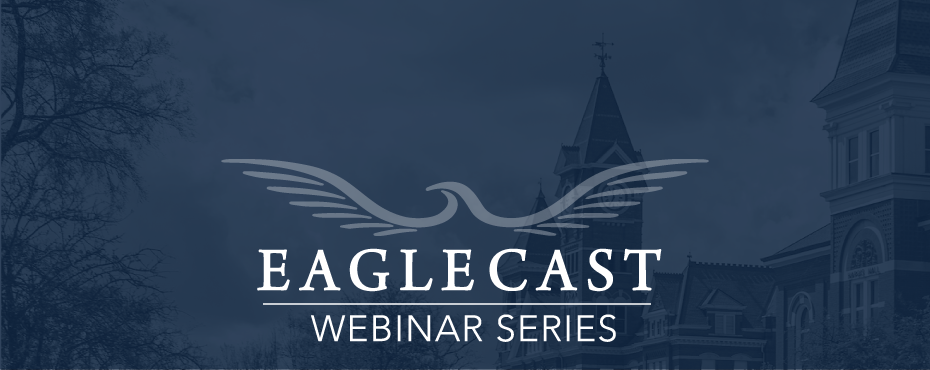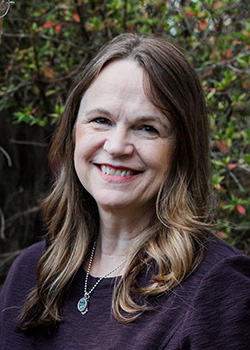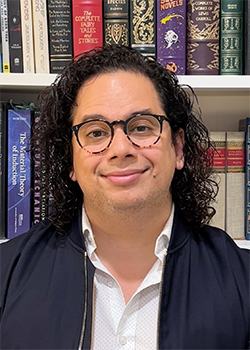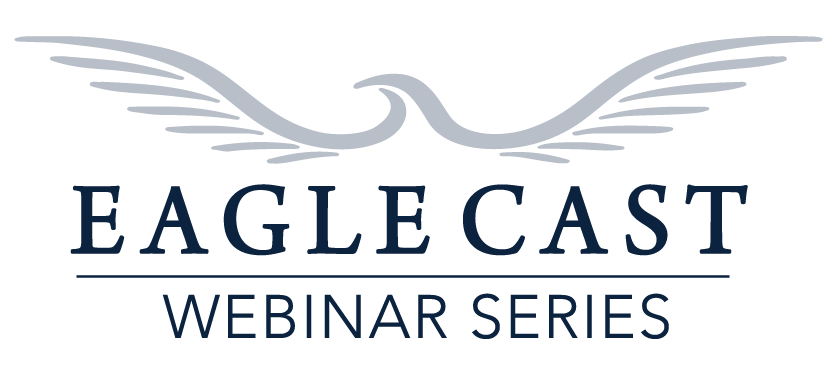
Overview
This monthly webinar series offered by Auburn University’s Office of Professional and Continuing Education at no cost to participants.
The series features experts from a variety of sectors including education, business, industry, public service, finance, and presents information and skills essential for navigating today’s ever-changing world.
Upcoming Webinars
May 20, 2025 | 8:30 – 9:30 A.M. Central Time
The Value of Traditional Crafting: A Journey of Learning, Expression, and Connection
Dr. Christine Schnittka
These days, we go shopping to get the stuff we want or need, but our ancestors used their hands to turn natural materials into what they needed for safety and comfort. Today we use computers and televisions to learn and disseminate knowledge. But our ancestors used their hands to engineer technologies for learning and disseminating information. They made paper and string from shrubs and grasses. They wove this string into fabric for protective garments and sewed up the paper into books. They used soot to make ink, and reeds to make pens. Our ancestors possessed keen material intelligence, creativity, and engineering skills. Traditional crafts like weaving, bookbinding, and making ink are an art form infused with science, technology, engineering, and mathematics concepts, and they are engaging, motivating, and tangibly related to everyday life. Making things also helps us feel in control, express ourselves, and it can give us a sense of purpose. Making things encourages us to think, helps us process emotions, and can even lower our heart and breathing rates. Scientists figured out 75 years ago that a very large part of your neocortex, that thin, most recently evolved outer layer of your brain, is devoted to your hands. What do you use your hands for nowadays? What do your children and grandchildren do with their hands all day?
In this presentation, Dr. Christine Schnittka, the author of Teaching STEAM Through Hands-On Crafts: Real-World Maker Lessons for Grades 3-8, will talk about how easy it is to use everyday materials to make useful things, and how teaching kids to make useful things with their hands can provide them with essential skills, help them with creative and critical thinking, and infuse them with the sense of self-reliance, while helping them use science and math to engineer useful technologies.
Get inspired to learn a new craft, experience the affective and educational benefits of crafting, and share your new skill with the young people in your life.

Christine Schnittka is the Emily R. and Gerald S. Leischuck Professor for Critical Needs in Education at Auburn University, the author of Teaching STEAM Through Hands-On Crafts: Real-World Maker Lessons for Grades 3-8 and has spent the last 20 years preparing future science teachers to teach with creative enthusiasm. As a former engineer and middle school science teacher, Schnittka develops design-based curricula for elementary and middle school youth by targeting science concepts through a maker lens. She likes to spend her free time knitting, 3D printing, bookbinding, and making functional pottery.
June 17, 2025 | 8:30 – 9:30 A.M. Central Time
Bias, Ethics, and AI: Aligning Algorithms with Human Values
Dr. Elay Shech
Artificial intelligence (AI) and Large Language Models are rapidly transforming nearly every aspect of our lives, from hiring decisions and assisting in medical diagnoses to communication, research, and decision-making. While these advancements bring efficiency and innovation, they also raise critical ethical concerns, such as bias in decision-making, transparency, accountability, and the potential displacement of human judgment and creativity. In this presentation, we’ll discover how various ethical and moral issues are entangled with AI and emphasize the importance of thinking philosophically about bias so that our AI systems can align with our values and promote human flourishing.

Dr. Elay Shech (https://elayshech.com/) is a Professor at Auburn University’s Department of Philosophy at the College of Liberal Arts. He specializes in philosophy of science and AI, and is currently working on a book on the philosophical and ethical aspects of AI in the context of recent advancements in deep learning. He holds a Ph. D. from the department of History and Philosophy of Science at University of Pittsburgh and Bachelor of Arts degrees in physics and in philosophy from Boston University. His books include Idealizations in Physics (Cambridge University Press), Scientific Understanding and Representation: Modeling in the Physical Sciences (Routledge), and Metaphysics of Color (Cambridge University Press).
July 22, 2025 | 8:30 – 9:30 A.M. Central Time
Emotional Intelligence in Business
Dr. Emory Serviss
This presentation will explore the concept of emotional intelligence (EI) and its growing importance in today's business environment. It will begin by defining EI and its core components—self-awareness, self-regulation, motivation, empathy, and social skills—before highlighting how organizations across industries are using it to enhance leadership, improve team collaboration, and strengthen customer relationships.

Dr. Serviss is a Senior Lecturer in the Department of Marketing in the Harbert College of Business at Auburn University, where he brings more than two decades of industry experience into the classroom. Before transitioning to academia, Dr. Serviss held senior marketing roles at Fortune 500 companies and advertising agencies, with a focus on digital marketing and strategy. Dr. Serviss’s research interests center on ethical leadership, sales management, artificial intelligence (AI), and social media. His scholarly work has appeared in journals such as the Journal of Personal Selling & Sales Management, Journal of Managerial Psychology, and Industrial and Organizational Psychology.
Past webinars are available on demand through Canvas Catalog.
Last Updated: April 18, 2025

